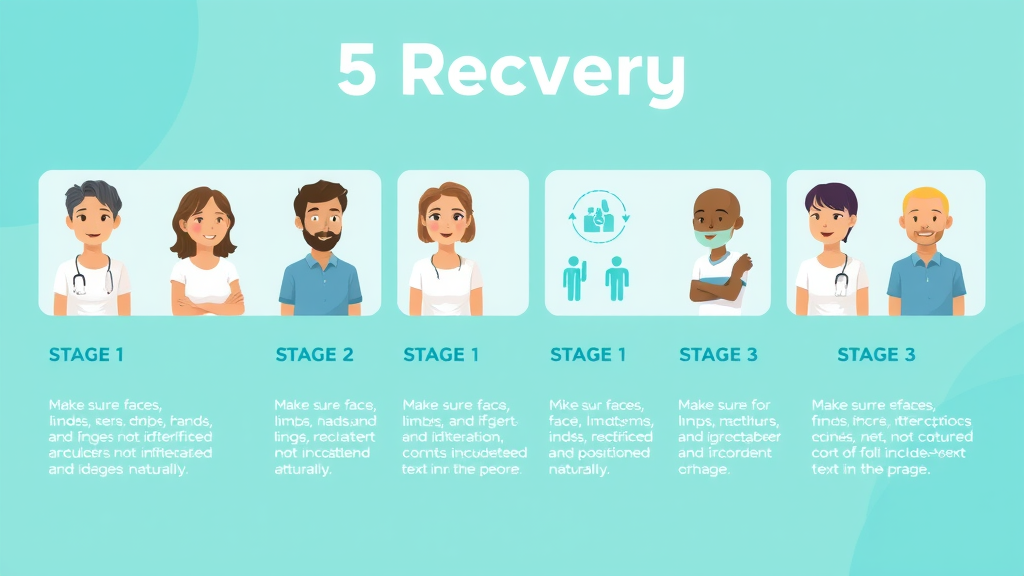Did you know only about 10% of people facing substance use disorders actually receive specialized addiction treatment? This sobering fact lies at the heart of one of society’s most pressing yet misunderstood challenges: addiction recovery. If you or a loved one are struggling to break free from drug addiction, alcohol addiction, or the grip of substance use disorder, understanding what works in recovery could transform your journey. In this guide, we’ll uncover surprising truths, practical resources, and actionable steps to make long-term recovery possible.
Battling Addiction Recovery: Surprising Facts You Need to Know

- Did you know only about 10% of people facing substance use disorders actually receive specialized addiction treatment? Explore why addiction recovery remains challenging and how evidence-based interventions offer hope.
Battling addiction recovery isn’t just about willpower—it's a complex process with medical, psychological, and social dimensions. Many people with substance use disorder never access the treatment they need. Stigma, misunderstanding of addiction as a chronic illness, and a lack of available addiction treatment programs all serve as major barriers. Evidence-based interventions—including therapy, medication-assisted treatment, and support group participation—are proven to boost recovery outcomes, yet remain underutilized.
Substance use disorder affects not just individuals but their entire network of loved ones. The cascade of impacts stretches from physical health deterioration and increased risk of mental health issues, to breakdowns in relationships and lost productivity. Effective addiction recovery hinges on tackling these aspects holistically, emphasizing the role of support groups, medical treatment, and continuous care for sustainable term recovery. The fact that only a fraction of those in need get help underscores the importance of accessible, evidence-based, and personalized treatment plans.
What You'll Learn About Addiction Recovery
- Key elements of effective addiction recovery
- Understanding the link between substance use disorder and mental health
- Critical steps and proven methods for sustainable addiction recovery
- The impact of support groups and treatment options
- How to support yourself or a loved one on the recovery journey
Understanding Addiction Recovery: The Interplay Between Substance Use, Mental Health, and Recovery
Recognizing Substance Use Disorder and Its Impact
- Defining substance use disorder and drug and alcohol addiction
- How mental health and substance use disorder are closely linked
- Effects on family members and loved ones
Substance use disorder goes beyond habitual drug use or alcohol addiction; it’s a chronic illness marked by compulsive behaviors despite negative consequences. Both drug addiction and alcohol addiction fall under this umbrella, often escalating silently until they severely impact daily life. For those living with these conditions, addiction recovery requires acknowledging both the physiological changes in the brain and the psychological drivers that keep cycles of substance use in motion.

In many families, substance use disorder generates deep ripples—loved ones may feel helpless, frustrated, or blame themselves. Yet, research finds strong correlations between untreated addiction in one family member and declines in mental health for others. This dynamic makes early intervention and community-based support group participation vital for everyone involved in the recovery journey.
Recognizing substance use disorder as a treatable medical condition helps break stigma and shame. Addiction recovery isn’t just about abstaining—it’s about rebuilding physical well-being, restoring broken trust among loved ones, and supporting mental health with therapy, medication when appropriate, and ongoing group support. Many people delay seeking help because of fear, denial, or misconceptions, but an accurate diagnosis is the essential first step to lasting change.
How Mental Health Influences Addiction Recovery
- Dual diagnosis: Treating mental health and addiction recovery together
- Importance of addressing underlying trauma and psychological challenges
Mental health is inseparable from the addiction recovery process. Dual diagnosis—when a person struggles with both substance use disorder and a mental health condition such as depression, anxiety, or PTSD—is incredibly common and often complicates treatment. Ignoring co-occurring disorders undermines the effectiveness of any addiction recovery plan.
Effective addiction treatment programs prioritize mental health support, combining cognitive-behavioral therapy, trauma-informed care, and sometimes psychiatric medication. This integrated approach not only addresses the consequences of drug and alcohol abuse, but also the root causes, such as unresolved trauma or chronic stress. Support group participation—whether in Alcoholics Anonymous, SMART Recovery, or specialized dual diagnosis groups—helps reinforce these lessons and connect people to others facing similar hurdles.
For many people, addressing psychological pain and building coping skills are just as important as ending substance use. Ongoing counseling, family therapy, and mindful self-care can dramatically increase the odds of term recovery. In short, addiction recovery isn't truly possible without confronting and healing parallel mental health challenges.
First Steps in Effective Addiction Recovery: From Awareness to Action
Acknowledging the First Step: Seeking Help
- Why recognition is crucial in any recovery journey
- Barriers that prevent many people from accessing addiction treatment or support group help
The first step in any recovery journey is acknowledging the problem. For most people, coming to terms with substance use is a huge hurdle—self-stigma, fear of judgment, and denial often keep individuals trapped in the cycle. Admitting to a drug and alcohol addiction or reaching out for help requires courage, but it is the gateway to possibility and hope for addiction recovery.
Many people never access addiction treatment or join a support group because of financial barriers, limited local resources, or cultural stigma. Some may not recognize the signs of substance use disorder until it deeply affects their mental health or disrupts family dynamics. Overcoming these obstacles by seeking education, talking with a trusted family member, or contacting a helpline can lay a strong foundation for the next stage: developing a personalized treatment plan.
If you or a loved one sense that drug use, alcohol dependency, or other addictive behaviors are spiraling, remember: the sooner you reach out, the better your chances for long-term addiction recovery. Professional assessments and compassionate support groups are available at every stage to help guide you safely forward.
Building a Personalized Addiction Recovery Treatment Plan
- Assessing substance use
- Collaborating with loved ones and healthcare professionals
Developing a personalized treatment plan is vital for successful addiction recovery. A thorough assessment—often facilitated by a healthcare professional—includes examining the frequency, duration, and effects of substance use. This process may involve physical exams, psychological evaluations, and discussion with family members to gain a complete picture of the challenge ahead.
Effective plans integrate mental health treatment, addiction counseling, and peer or family support, tailoring steps to the individual’s unique needs. Collaborating with loved ones builds accountability and provides encouragement throughout the treatment journey. Support groups , both for individuals in recovery and their families, are invaluable in addressing the emotional side of recovery and maintaining motivation.
Involve experts—addiction counselors, therapists, addiction medicine physicians—who can adjust your treatment plan as you progress. This roadmap should include measurable goals, regular benchmarks, and flexibility to adapt if setbacks occur. Remember, addiction recovery is rarely linear, but adapting your strategy ensures resilience and progress.
Proven Addiction Recovery Treatment Options and Programs
Exploring Types of Addiction Treatment
- Outpatient vs. residential rehab programs
- Medication-assisted addiction treatment
- Detoxification and medical supervision

There are several addiction recovery treatment options available, each suited to different needs and lifestyles. Outpatient programs enable individuals to live at home while attending therapy and medical appointments, providing flexibility and access to community support. These are often effective for people with less severe addictions or strong support networks.
Residential rehab programs, on the other hand, provide immersive, round-the-clock care in a structured environment—ideal for those facing severe substance use disorders, repeated relapses, or unsafe home situations. Medical supervision during detoxification ensures withdrawal is handled safely. Medication-assisted treatment —which may include methadone, buprenorphine, or naltrexone—can manage cravings and stabilize mental health, making it possible to focus on long-term recovery work.
Choosing the right treatment option may also depend on personal and local resources, insurance coverage, and the complexity of mental health or dual diagnosis concerns. Always consult a healthcare provider for guidance based on an assessment of your specific situation. Combining medical, psychological, and social elements maximizes the odds of success.
Therapy, Counseling, and Support Groups in Addiction Recovery
- Benefits of individual, group, and family therapy
- Alcoholics Anonymous and other support groups
- Role of community and peer support in long-term recovery
Therapy is a cornerstone of effective addiction recovery. Individual therapy gives people the chance to address underlying trauma, build coping skills, and develop healthier thought patterns in a one-on-one setting. Group therapy —led by trained counselors—creates accountability and shows that recovery is possible, thanks to the shared experiences and encouragement of peers.
Family therapy can mend relationships affected by substance abuse and help rebuild trust with loved ones. This aspect is critical as many people rely on their family for continued emotional support during difficult stages of the recovery journey. Participation in well-established support groups like Alcoholics Anonymous or similar networks offers ongoing encouragement and structured opportunities for growth.
Community support groups and peer support are key in maintaining term recovery. They provide a safe space to share challenges, celebrate victories, and receive practical advice from those further along the same path. Engaging with these resources regularly—and integrating them into your long-term plan—vastly increases resilience and reduces relapse risk.
Watch: A Day in Residential Rehab — Follow a real patient’s addiction recovery journey
Sustaining Long-Term Addiction Recovery: Tools, Tips, and Motivational Strategies
- Setting realistic treatment goals
- Identifying and managing triggers for drug and alcohol relapse
- Incorporating holistic approaches—exercise, mindfulness, nutrition
- Building a strong support network
- Monitoring progress and adjusting your recovery journey
"Addiction recovery is not a race—it’s a marathon of hope, resilience, and self-discovery."

Sustaining term recovery from addiction involves more than just abstaining from substances. Setting realistic treatment goals gives structure and purpose to each stage of the journey, empowering individuals to celebrate incremental progress. Identifying triggers—situations, emotions, or relationships that encourage relapse—and developing healthy ways to respond, such as using mindfulness or seeking support group help, can dramatically curb setbacks.
Holistic practices, including regular exercise, mindfulness or meditation, and solid nutrition, fortify both body and mind for the demands of addiction recovery. Building and nurturing a strong support network —with family, peers, counselors, and recovery groups—ensures you’re never facing challenges alone. Regularly monitoring progress, such as checking in with a therapist or tracking milestones, helps keep motivation high and flags issues before they escalate.
Flexibility is key: as life circumstances change, so too should your recovery strategies. Adjustment isn’t a sign of weakness but an indicator of resilience and long-term success. Remember, addiction recovery is a lifelong commitment to self-care, growth, and connection.
Helping Loved Ones Through Addiction Recovery
Supporting a Family Member or Friend with Substance Use Disorder
- Encouraging treatment without enabling substance abuse
- Finding local and online support groups for families
If someone you care about is battling substance use disorder, support can make all the difference. The key lies in encouraging addiction treatment or intervention—without enabling destructive behaviors. This may mean expressing concern directly, setting healthy boundaries, and avoiding actions (like covering up consequences or bailing them out) that remove the personal responsibility necessary for change.
Connecting with other family members and loved ones facing similar challenges offers emotional relief and practical guidance. Many support groups exist for families, such as Al‑Anon, Nar-Anon, or local online forums. These resources provide coping skills, education about addiction, and a place to share the ups and downs of the recovery journey.
Step into the role of an ally, not a rescuer. Encourage your loved one to join a support group, seek professional help, and participate in family therapy as part of their recovery. Your support—combined with firm limits and compassion—can set the stage for sustained progress.
When Professional Help for Addiction Recovery is Necessary
- Signs that intervention is critical
- Types of professionals involved in addiction treatment
It’s time to seek professional help when substance use poses safety risks, disrupts daily functioning, or repeatedly defies attempts at self-managed recovery. Warning signs might include medical emergencies, suicidal thoughts, aggressive behavior, or an inability to care for children or maintain employment.
Addiction treatment professionals include addiction medicine doctors, psychiatrists, clinical psychologists, counselors, social workers, and specialized case managers. Each brings expertise in assessment, therapy, medication management, and support planning. Involving the right experts ensures a comprehensive, multifaceted approach—maximizing the odds of a meaningful, lasting change.

Don’t wait for a crisis. If you sense your loved one is declining, consult a healthcare provider or contact a local addiction recovery center immediately. Early intervention leads to greater success and less harm for everyone involved.
Watch: Family Perspectives—How to Contribute Positively to a Loved One’s Addiction Recovery
Five Rules and Stages of Addiction Recovery (PAA Section)
What are the 5 rules of recovery?
- Change your life
- Be completely honest
- Ask for help
- Practice self-care
- Don't bend the rules—commit daily
The five rules of recovery offer a practical foundation for anyone pursuing addiction recovery: (1) radically change your environment and routines to support sobriety; (2) maintain complete honesty with yourself and others; (3) reach out for help from support groups and loved ones; (4) prioritize self-care to rebuild physical and mental health; and (5) honor your commitment every day, not just when it’s convenient. These principles help maintain clarity, structure, and ongoing motivation on the recovery journey.
Will an addict ever change?
- Yes, lasting change is possible through sustained commitment, addiction treatment, ongoing support, and a robust mental health and addiction recovery plan.
Absolutely— lasting change is not just possible, but expected for many who engage in comprehensive addiction treatment and ongoing support. While relapse may occur, a strong support system, medical guidance, and continuous attention to mental health and environmental factors make sustained term recovery a reality for countless individuals. The journey may be long, but transformation is always within reach.
What are the 7 tips of recovery if you are an addict?
- Acknowledge the issue
- Seek help early
- Practice self-care
- Participate in support group programs
- Avoid triggers
- Set clear goals
- Celebrate small victories
For those embarking on addiction recovery, these 7 tips can guide progress: (1) admit there’s a problem; (2) act quickly to find help; (3) prioritize your mental and physical well-being; (4) stay engaged with support groups and therapy; (5) understand and steer clear of triggers; (6) have clear, attainable objectives; and (7) reward yourself for progress, no matter how small. Following these steps lays a solid foundation for meaningful, incremental achievements on your recovery journey.
What are the 5 stages of recovery?
| Stage | Description |
|---|---|
| Precontemplation | Not yet admitting addiction |
| Contemplation | Recognizing the problem |
| Preparation | Making a plan for change |
| Action | Implementing new behaviors |
| Maintenance | Sustaining recovery long-term |

These five stages highlight the mental and behavioral journeys people take—from denial to action, and ultimately to consistent recovery. Understanding where you, your loved one, or even your support group members fall within these stages can help tailor addiction treatment strategies for maximum impact.
Comparing Addiction Recovery Programs: What Works Best?
| Treatment Option | Setting | Support Level | Success Rate |
|---|---|---|---|
| Outpatient | Community | Moderate | 50-60% |
| Residential Rehab | Facility | High | 60-75% |
| Medication-Assisted | Facility/Outpatient | High | Varies by drug |
"Recovery does not mean cure. It means managing a chronic illness, daily."
No single treatment option is universal: outpatient programs offer flexibility and accessible support group links, while residential rehab delivers immersive, high-support experiences. Medication-assisted options—especially for opioid and alcohol addiction—improve outcomes, particularly when paired with therapy and peer support.
The key for your recovery journey is personalization—balancing structure, professional care, and ongoing community engagement for optimal term recovery. Speak with a healthcare team to determine which path fits best, adjust as you progress, and never underestimate the power of connection in building lasting change.
Frequently Asked Questions on Addiction Recovery
-
How long does addiction recovery take?
Recovery is a lifelong process. While detox and treatment can last weeks or months, maintaining sobriety and mental health requires ongoing effort and support. -
Can addiction recovery address both substance use disorder and mental health?
Yes—effective programs integrate therapy for both addiction and co-occurring mental health conditions (dual diagnosis) for comprehensive healing. -
Are relapses part of the addiction recovery journey?
Relapse can happen, but it doesn’t mean failure. Adjusting your treatment plan and drawing on support groups can help get you back on track. -
How can family members best support loved ones in recovery?
By encouraging professional help, joining family support groups, setting boundaries, and offering consistent support through ups and downs.
Key Takeaways for Anyone Pursuing Addiction Recovery
- Personalized plans are essential
- Address both substance use and mental health
- Support networks—family, support groups, therapy—are crucial
- Persistence and ongoing motivation make a difference
Join the Addiction Recovery Journey Today
- If you or a loved one are seeking lasting change, take the first step towards addiction recovery. Professional help, personalized plans, and community support can make the transformation possible. Visit us at https://thehovecounsellingpractice.co.uk/contact/ or call: 07947 073298
Conclusion
Take action today. Reaching out for addiction recovery support is the first—and most important—step toward a healthier, hopeful future.
Sources
- National Institute of Mental Health
- National Library of Medicine: Principles of Drug Addiction Treatment
- SAMHSA: Medication-Assisted Treatment
- Centers for Disease Control and Prevention
- The Hove Counselling Practice
For those seeking to deepen their understanding of addiction recovery, the following resources offer valuable insights:
-
“Treatment and Recovery” by the National Institute on Drug Abuse (NIDA) provides comprehensive information on effective treatment principles, including the integration of medications and behavioral therapies to address substance use disorders. ( nida.nih.gov )
-
“Recovery” by NIDA explores the multifaceted process of recovery, emphasizing health improvement, self-directed living, and the pursuit of full potential, while highlighting various recovery programs and support systems. ( nida.nih.gov )
These resources offer evidence-based strategies and support systems essential for a successful recovery journey.
 Add Row
Add Row  Add
Add 


Write A Comment